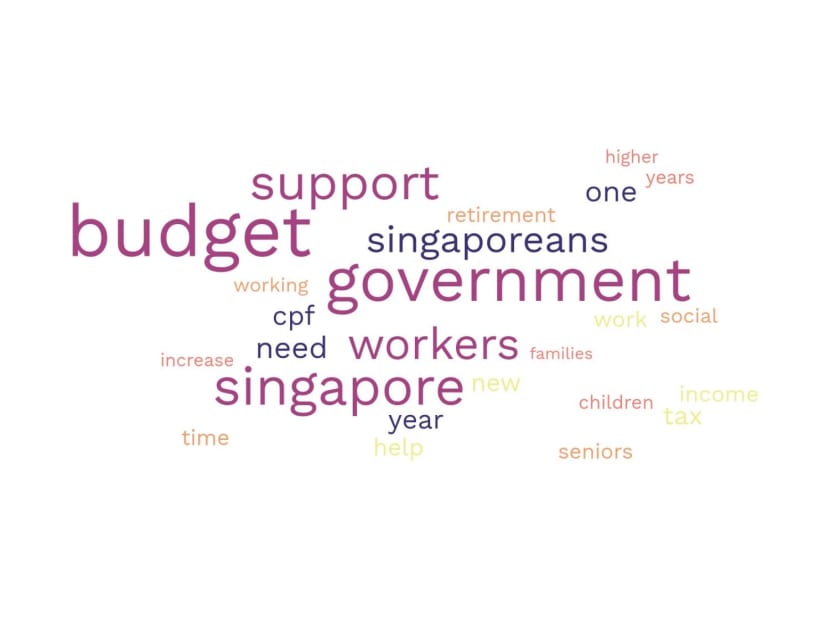What were the most-used words by MPs on Day 1 of Budget 2023 debate?
SINGAPORE – As Members of Parliament (MPs) kicked off the debate on Budget 2023 on Wednesday (Feb 23), two words kept coming up: “Support”, which was mentioned 201 times, followed by “workers”, which had a total of 170 mentions.

- “Support” and “workers” were two words most frequently mentioned by MPs on the first day of the debate for Budget 2023
- The next most-repeated words were “tax”, “seniors” and “CPF”, which were mentioned about 100 to 140 times each
- A total of 27 MPs debated in Parliament over the Budget statement that was delivered by Deputy Prime Minister and Finance Minister Lawrence Wong on Feb 14
SINGAPORE – As Members of Parliament (MPs) kicked off the debate on Budget 2023 on Wednesday (Feb 23), two words kept coming up: “Support”, which was mentioned 201 times, followed by “workers”, which had a total of 170 mentions.
Other often-used words were “tax”, “seniors” and “CPF” — short for Central Provident Fund. These were mentioned about 100 to 138 times each.
These excluded the other most common terms that one would expect to hear during the yearly debate such as "Singaporeans", "Singapore", "Budget" and "Government".
In almost nine hours, a total of 27 MPs debated on the Budget, which was delivered by Deputy Prime Minister and Finance Minister Lawrence Wong last week.
Here below is a summary of how these words related to the hot topics of the day.
‘SUPPORT’
The Budget has various support schemes to be rolled out for Singaporeans at various life stages, especially for the low- and middle-income groups.
These include a one-off cost-of-living special payment of between S$200 and S$400 for eligible Singaporeans, the doubling of U-Save utilities bill rebates and an extra S$300 Community Development Council (CDC) Voucher for each household to help with rising prices.
Six MPs noted the S$3,000 increase in the Baby Bonus cash gift for all Singaporean children born from Feb 14 this year as a generous support package to ease the cost of raising children.
Mr Zhulkarnain Abdul Rahim, MP of Chua Chu Kang Group Representative Constituency (GRC), suggested that more measures can be introduced to alleviate the costs of raising a child, including special CDC Vouchers for households with young children that can be used to offset children’s needs and even educational expenses.
‘WORKERS’
More than 10 MPs backed the measures to empower and upskill the domestic workforce, given the manpower shortage due to tighter labour policies restricting foreign worker supply and a limited pool of resident high-skilled workers.
Among these was the Job-Skills Integrator initiative, in which appointed institutions such as trade associations and training providers will work with job placement partners to improve workers’ employability and salary prospects.
About eight MPs spoke about the Progressive Wage Model, which increases the salaries of low-wage workers according to industry, as a significant step in tackling income inequality.
Mr Xie Yao Quan, MP for Jurong GRC, also called for a regular review of the wage model to ensure that the salaries of lower-wage workers grow faster than the rate of cost of living.
‘TAX’
The tax changes in the Budget statement also became a talking point as MPs spoke about the increased stamp duties on higher-end properties and luxury cars in an effort to shift towards a progressive tax system.
As Ang Mo Kio GRC MP Darryl David said, this year’s Budget sends a strong signal that the wealthy in Singapore can, and should, contribute more to nation-building by paying higher taxes.
The progressiveness of the tax system also extends support to working mothers, under the Working Mothers’ Child Relief. These women are given tax reliefs of a fixed amount based on their income levels.
This may help ease the financial costs on working mothers, but Workers’ Party (WP) MP Louis Chua of Sengkang GRC noted that unwed single mothers are not eligible for this tax relief and proposed that the Government include them in the scheme.
‘SENIORS’
Senior citizens’ welfare was a hot issue, in light of Singapore’s rapidly ageing population and ageing workforce.
MPs voiced their support for the measures in Budget tied to assisting the older population, such as the top-ups of S$500 million to the Eldercare Fund and S$1.5 billion to the Medifund.
The Eldercare Fund under the Ministry of Health (MOH) offers operating subsidies to intermediate and long-term care providers such as nursing homes run by non-profit organisations.
Medifund, also under MOH, is an endowment fund for patients who face financial difficulties with their remaining bills after receiving government subsidies and other means of payment via cash or CPF savings.
Some other measures were the extension of the Senior Employment Credit, which offsets 6 per cent to 8 per cent of wages for senior workers until 2025.
Leader of the Opposition Pritam Singh from WP said that the Senior Employment Credit helps to retain and hire seniors, but employers should also adjust and reconsider human resource policies and job scopes to hire seniors permanently.
‘CPF’
The CPF monthly salary ceiling will be raised progressively from S$6,000 now to S$8,000 in 2026 to help Singaporeans save more for retirement.
Another change will be that platform workers below the age of 30, such as food deliver workers and private-hire car drivers, have to contribute to their CPF Ordinary and Special Accounts from late 2024, in a step to boost their financial security.
MP Liang Eng Hwa of Holland-Bukit Timah GRC said that although the changes will help support the housing, medical and retirement needs of platform workers, they are concerned about how this will reduce their take-home pay even though there will be “transitional support” to cushion this effect.
MP Foo Mee Har from West Coast GRC also said that the raised CPF salary ceiling could be a difficult adjustment for employers to make, seeing that there will be other changes such as the increased CPF contribution for older workers and the doubling of paternity leave.








